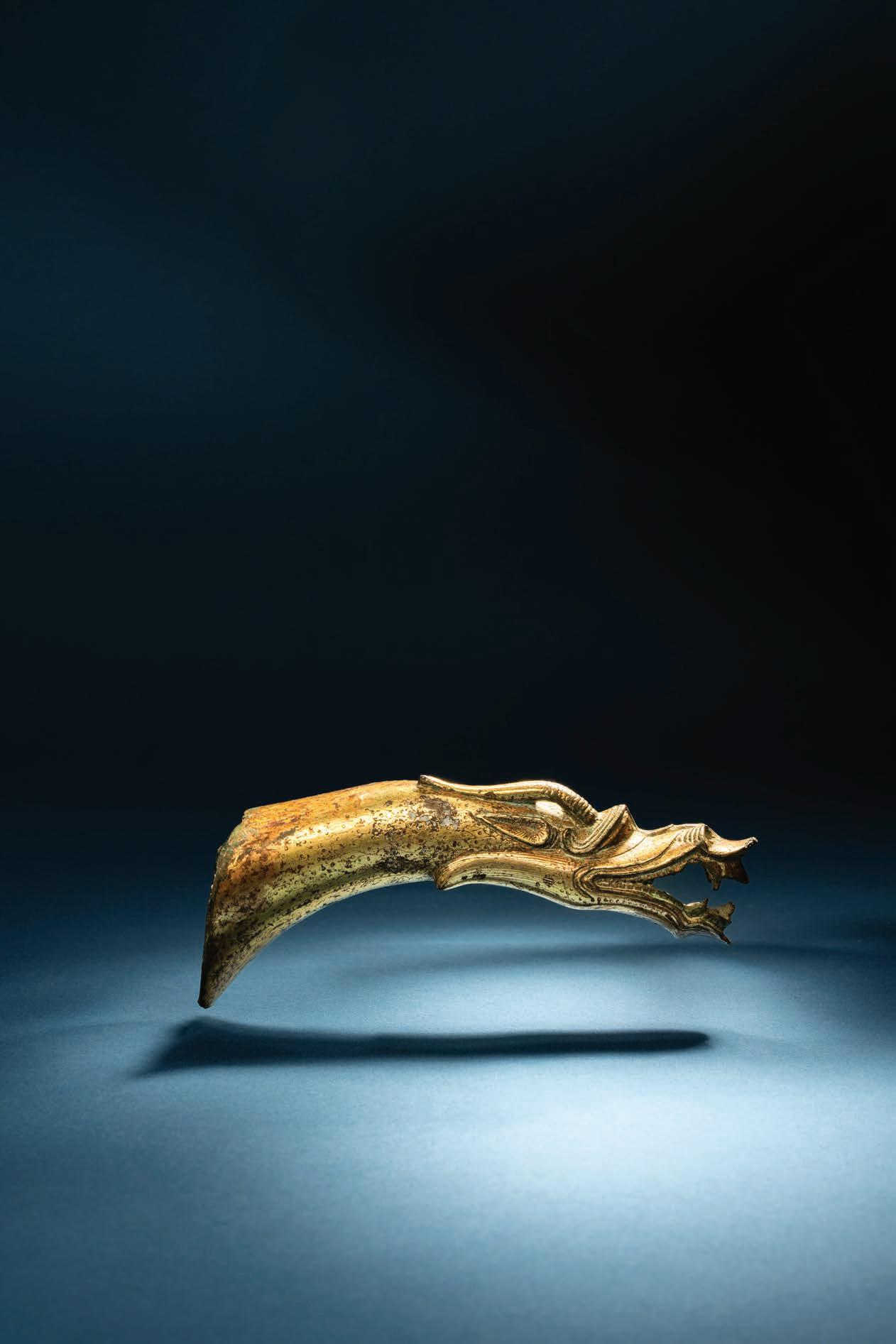
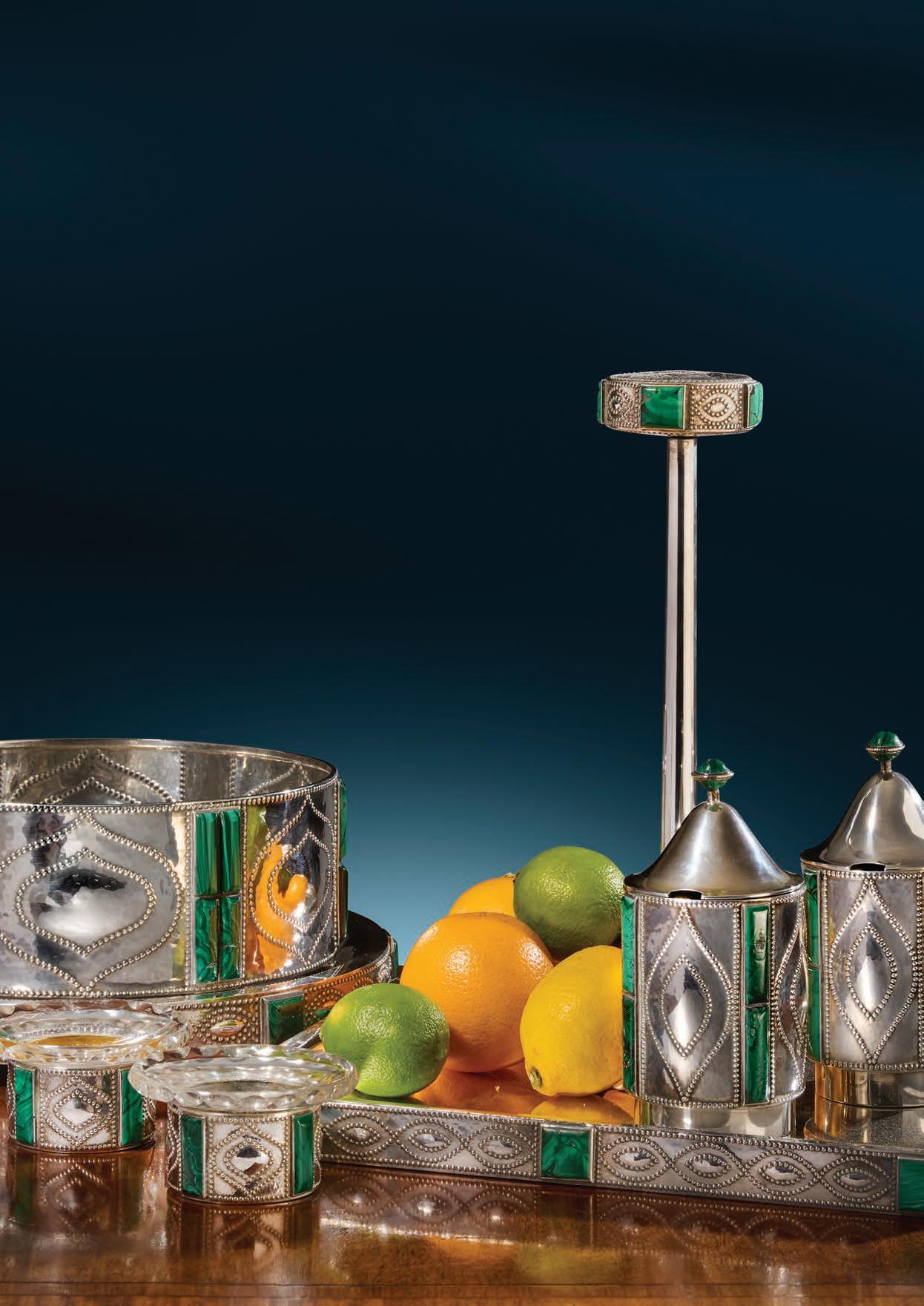
SALE NEWS | SPRING/SUMMER 2023
APRIL
18th & 19th
20th & 21st
26th & 27th
MAY 17th 23rd, 24th & 25th
JUNE
7th 21st 12th–23rd
JULY
5th & 6th
11th & 12th 13th
SEPTEMBER
6th 19th 20th
Silver & Objects of Vertu
Fine Jewellery
British & Continental Ceramics & Glass
Medals & Coins, Arms & Armour
Asian Art, Chinese Paintings & Japanese Works of Art
Modern British & 20th Century Art
Fine Arts & Crafts (Including Martin Ware)
Exhibition: Robert Wallace Martin
Potter, Sculptor, Artist
Furniture, Works of Art & Clocks
Silver & Objects of Vertu
Fine Jewellery
Old Masters, British & European Paintings
British & Continental Ceramics & Glass
Arts of Africa, Oceania and the Americas
enquiries@woolleyandwallis.co.uk www.woolleyandwallis.co.uk
51–61 Castle Street, Salisbury, Wiltshire SP1 3SU +44 (0)1722 424500
APRIL–SEPTEMBER 2023
Visit woolleyandwallis.co.uk/buying for additional charges on final hammer price. Sold prices include buyer’s premium
CALENDAR
Right: Stoclet Palace a UNESCO World Heritage site since 2009
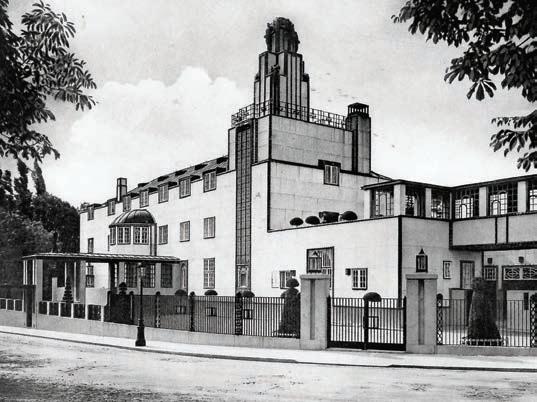
Front cover:
A Wiener Werkstätte silver and malachite fruit tray designed by Josef Hoffmann
Estimate £10,000–20,000
Auction on 21st June
Back cover:
A rare Chinese gilded bronze dragon-head finial dating to the Eastern Han dynasty, (25–220AD), 14.5cm
Provenance:
The H K Burnet Collection, sold Sotheby’s 1941; the collection of Mark Dineley (1901–75), and thence by descent.
Similar dragon-head finials are exhibited in both the British Museum, London, and the Metropolitan Museum of Art, New York.
Estimate £20,000–30,000
Auction on 24th May
CHAIRMAN’S INTRODUCTION
FINDING RARE TREASURES
We are excited to be offering a number of great rarities from the Stoclet Collection, some of which are featured in the following pages. One of the highlights is the exceptional Hoffmann silver table service on the cover of this newsletter. We have ancient Chinese treasures which were exhibited in the early 1900s in the Cernuschi Museum and the Orangerie in Paris, as well as treasures exhibited at the Burlington House Exhibitions of Persian and Chinese Art in the 1930s. There is even a collection of Merovingian style jewellery dating to the 8th century.
VALUERS OF THE FUTURE

I have always been a believer in training the next generation of auctioneers, and I’m pleased that our programme for trainee valuers announced last year is now well underway. I can report that as well as Archie Swann, we also have Hannah Farthing, who has been in our Paintings department for two years, but has been lured by the wider pull of antiques and art across the board. Archie is currently working with our Furniture department. The monthly exam papers have so far included questions on mazer bowls, Jupe’s patent, duty drawback marks and Billy and Charleys.
In June we will continue to sponsor the Chalke Valley History Festival and the Haughton International Seminar, ‘Looking at Private Museums and Collections’. With the Oriental Ceramic Society, we have recently had a handling session of important Chinese jades that we will be selling in November (see page 41). There are exciting events in the pipeline including a second charity auction on behalf of Horatio’s Garden, and a fabulous exhibition of Martin Brothers Pottery.
John Axford
CHAIRMAN’S INTRODUCTION | 1
SILVER & OBJECTS OF VERTU
With the coronation of King Charles III fast approaching, we are thrilled to include in our next sale of Silver & Objects of Vertu a rare item in keeping with the times, a silver-gilt George II coronation canopy bell. Only a small group of coronation bells survive today, originally made to embellish the canopy held by the Barons of the Cinque Ports above the sovereign during their coronation. One bell was the prerequisite of each bearer, and this example is particularly significant, as it has come to the present owner by descent from the Hon. George Berkeley, canopy bearer for George II as M.P. for Dover.
The Silver department has had the privilege of selling a number of important early silver spoons in recent years, and the April sale is no exception. A particular feature of the sale is a private collection of fifteen lots, almost unique in featuring an example from the reign of every Tudor monarch. Notable lots include a Henry VII Wrythen Knop spoon originally from the Staniforth Collection, once the earliest dated spoon known, and a pair of Henry VII Apostle spoons from the first recorded set to bear full London hallmarks.
We are also pleased to include a hundred and twenty lots from the collection of the late Barry Lock. A connoisseur of fine silver, Lock was not just a passionate collector but also a keen enthusiast of aristocratic history, conducting research into the distinguished past of many of his items. Amongst these, is a marvellous silver-gilt trophy ewer, The Wellington Cup, bearing a presentation inscription to Lord Rous and hallmarks for John Houle, London 1815.

The upcoming sale will also showcase a number of further private collections, one including a prized group of silver and old Sheffield plate argyles. Other highlights include, a beautiful bowl by renowned Arts & Crafts silversmith Gilbert Marks, with embossed daffodils and hammered decoration and a
Rupert Slingsby +44 (0)1722 424501 rs@woolleyandwallis.co.uk
Lucy Chalmers +44 (0)1722 424594 lc@woolleyandwallis.co.uk
18TH & 19TH APRIL
Left: A collection of argyles Estimates range from £100–1,000
A rare silver-gilt

Estimate
Above right:
A rare and important pair of Henry VII silver Apostle Spoons, St. Simon Zelotes and possibly St. Phillip, maker’s mark of a device known as a Gothic L, London 1490, length 18.2cm and 18cm

Estimate £30,000–40,000


Visit woolleyandwallis.co.uk/buying for additional charges on final hammer price. Sold prices include buyer’s premium | 3
Top left: By Gilbert Marks, a late-Victorian Arts and Crafts silver bowl, London 1896/97, also signed Gilbert Marks 97, diameter 23.7cm Estimate £2,000–3,000
Top right:
A George III silver-gilt trophy ewer, The Wellington Cup, by John Houle, London 1815, height 34.2cm
Estimate £2,500–3,500
Above left:
George II silver-gilt coronation canopy bell, by Francais Garthorne, London circa 1727, height 7.1cm
£7,000–10,000
Below Lot 1636
A late 19th century diamond parure, comprising a necklace, earrings, a stomacher and a brooch Estimate £50,000–70,000

Below top:
An 8th century Caucasian/Bulgarian bronze buckle from the collection of Adolphe Stoclet

Estimate £1,000–2,000
Below:
Ethel Lady Inchiquin dressed probably for the House of Lords or even The Coronation of King Edward VII in 1902. She is wearing the parure (lot 1636) with the exception of the earrings, and the emerald and diamond centrepiece (lot 1637) worn as a brooch centrally pinned to her dress

Below right: Lot 1637
A suberb emerald and diamond bangle, the emerald weighing 5.66cts, with SSEF certification, Colombian, no oil

Estimate £60,000–80,000
FINE JEWELLERY
Lots 1636 and 1637 in the Fine Jewellery auction were originally owned by Lord Lucius O’Brien, 15th Baron Inchiquin (1864–1929) and Ethel Lady Inchiquin (1867–1940). She married the 15th Baron Inchiquin in 1896 who succeeded the peerage in 1900, thence by descent to the current owner.
Included in the auction are items from the Adolpe Stoclet collection. Originally believed to be Merovingian, from the 5th century area that is now France and Western Germany. These were described as such in the catalogue produced by Stoclet’s daughter, Madame Feron-Stoclet who inherited the collection. Contemporary research now places these objects a century or two later and from the North Caucasian and Bulgarian areas with the Merovingian influence still clearly visible.
Visit woolleyandwallis.co.uk/buying for additional charges on final hammer price. Sold prices include buyer’s premium | 5 20TH & 21ST APRIL



| FINE JEWELLERY 6
Marielle Whiting FGA

+44 (0)1722 424595
mw@woolleyandwallis.co.uk

Jonathan Edwards FGAA
+44 (0)1722 424504
je@woolleyandwallis.co.uk
Samuel Hug FGA DGA
+44 (0)1722 446586
sh@woolleyandwallis.co.uk
BRITISH & CONTINENTAL CERAMICS & GLASS
SUCCESS TO THE PRIVATEER
Many a Hollywood film has been made depicting the swashbuckling life of pirates, with names such as Blackbeard, Henry Morgan and Calico Jack reverberating through history. Far more common, and yet less well-documented, is the practice of privateering that dominated English shores during times of war.
The second half of the 18th century was a prime time for privateering – a form of legalised piracy where mariners were granted permission to attack and pillage the ships of Britain’s foreign enemies (usually France and Spain). During the Seven Years War (1756–63) letters of marque were issued to owners of small and large sailing vessels alike, and the process continued for various conflicts up until 1856, when privateering was abolished.
In the early 1990s, research undertaken on a large Lowestoft porcelain bowl was able to relate it to a family of privateers living in Folkestone, Kent. Records indicate that the Major family were operating off the coast of Kent with letters
 Clare Durham +44 (0)1722 424507
Clare Durham +44 (0)1722 424507
26TH & 27TH APRIL
| BRITISH & CONTINENTAL CERAMICS & GLASS 8
cd@woolleyandwallis.co.uk
of marque for a period of some 20 years, and the bowl (inscribed for Henry Major) was probably made to commemorate their first foray into privateering in 1761. It sold in our auction on 21st February for £4,375 – the price being kept down by a substantial riveted crack, which deterred several collectors.

More commonly seen at auction, but still rare, are wine glasses commemorating privateering vessels. These were often made as gifts to enterprising captains or ship owners. They were made for ordinary merchantmen as well, but it is the examples that can be related to privateering that command the higher prices among collectors.


One example in our upcoming April auction is inscribed ‘Success to the HORNET Privateer’. The National Archives record letters of marque in August 1758 for a ship called The Hornet, owned by Richard Earnshaw and the Company of London; and also in October of the same year owned by the Company of Bristol. However, another privateer of the same name is recorded in 1777 operating out of Liverpool.
Many of the privateers operated out of Bristol and one of the best known of these was a frigate called Eagle. These are well documented in a 1930 book by Damer Powell. The Eagle was purpose-built as a privateer and took to the seas in 1756 under the command of Captain John Knill, whose name appears on several recorded privateer wine glasses. An example in our April sale is inscribed for Benjamin Huntly with the date 1757. Few records of sailors on privateer vessels survive and nothing is known of Huntly’s connection with the Eagle A Captain Benjamin Huntley of the Friendship is recorded as prosecutor in a trial at the Old Bailey in 1794, which may be the same man but sadly many of the individuals behind Britain’s extensive privateering industry have become buried in history.
Visit woolleyandwallis.co.uk/buying for additional charges on final hammer price. Sold prices include buyer’s premium | 9 Opposite: Head of Department, Clare Durham, with a rare documentary Lowestoft bowl Sold for £4,375 Above left: A Privateer wine glass, dated 1757 Estimate £400–600 Above right: A Privateer wine glass relating to the Hornet, c.1760 Estimate £3,000–5,000
MEDALS & COINS, ARMS & ARMOUR
The final days of May 1940 were a time of acute crisis for the British people, at every level of society: from the soldiers of the British Expeditionary Force defending their dwindling foothold on the European continent in the face of the Nazi onslaught, to the new Prime Minister Winston Churchill supporting a colossal weight of responsibility while defeatism within his own cabinet threatened to undermine him.
But a British capitulation would have had dire consequences far beyond Britain itself. It would have left Adolph Hitler the uncontested master of Europe, with no enemies among the major world powers. It is impossible to say what would have happened next, but without a Naval Blockade of Germany, without British and Commonwealth Forces fighting the Axis in North Africa, without the aerial bombardment of German industry and infrastructure, and without so many of the other commitments and distractions that characterised the following years, the Nazis could have turned on their Soviet allies at a time of their choosing, and with far greater concentration of resources than was in fact the case. The chances of American intervention in Europe would have dwindled, and in any case there would have been no British Isles from which to launch such an intervention.
The successful evacuation from Dunkirk, by the Royal Navy supported by civilian vessels, of the majority of the British Expeditionary Force transformed this situation. Talk of surrender was silenced, and Britain remained in the war.
One man who played a key role in these events is represented by the medals illustrated here. Lieutenant Robert Bill, Royal Navy, was sent to Dunkirk from Dover in charge of six trawlers, tasked with assisting with the organisation of evacuation ships and the embarking of soldiers under circumstances of great danger and difficulty. During the most intense phase of the German aerial bombardment his physical courage and professionalism enabled him to perform remarkable feats in keeping the evacuation moving. Among other things, his presence of mind and keen maritime instincts ensured the removal from the pier of the stricken destroyer Grenade, moments before she exploded. At one point he became more intimately involved on-shore when, in support of the piermaster Commander Jack Clouston R.N., he was obliged to maintain order among the waiting soldiers with a drawn revolver.
Lieutenant Bill’s was rightly decorated for his “fine display of officer-like qualities and gallantry under fire”, and his Distinguished Service Order and campaign medals will be offered in our May 17th auction of Medals & Coins, Arms & Armour – a remarkable tangible link to those desperate days when the fate of the free world hung in the balance.
Ned Cowell
+44 (0)1722 341469 | nc@woolleyandwallis.co.uk
Opposite: The Operation Dynamo D.S.O. group of seven awards to Lieutenant Robert Bill, R.N Estimate £2,000–3,000
17TH MAY
| MEDALS & COINS, ARMS & ARMOUR 10

PAINTINGS AND WORKS OF ART
THE STOCLET COLLECTION
“There is nothing of the expected in this collection, for the collector was only interested in the exceptional”
Georges A. Salles, Directeur des Musées de France
Adolphe Stoclet (1871–1949) was a Belgium engineer, financier, and notable collector of antiquities. With his wife, Suzanne, he amassed an eclectic and encyclopaedic collection of ‘haute epoque’ pieces from ancient civilisations including China, Cambodia, Egypt, Mesopotamia, pre-Columbian Mexico and tribal Africa.

In 1905 the Stoclets’ passion for art, architecture and antiquities culminated in the commission of Josef Hoffmann, of Wiener Werkstätte, to build Stoclet Palace in Brussels to house their extensive collection.
The palace is considered to be one of the great monuments of Vienna Secession architecture, heralding the birth of modernism and embodying the concept of Gesamtkunstwerk.
Gesamtkunstwerk was written about by the composer Richard Wagner in 1849, heralding his aesthetic ideals for theatre to be a total work of art. Every dimension of Stoclet Palace - interior and exterior architecture, decoration, furniture, silverware, gardens and planting – is praised for its unity of style.
The Stoclets were avant garde in the truest sense of the term, their aesthetic innovation and passion for creativity brought together the artists of the age; Gustav Klimt painted the mural in the dining room of Stoclet Palace, his last monumental piece before his untimely death in 1918.
Adolphe and Suzanne Stoclet entertained Queen Elizabeth and the King of Sweden as well as historians, archaeologists, writers, and musicians however, pieces from the Stoclet Collection have rarely been published or seen in the public domain.
John Axford
+44 (0)1722 424506 | jea@woolleyandwallis.co.uk
Freya Yuan-Richards
+44 (0)1722 424589 | fyr@woolleyandwallis.co.uk
Jeremy Morgan
+44 (0)7812 601098 | jm@woolleyandwallis.co.uk
Opposite:
This rare marble stele depicting the Buddhist goddess Guanyin predates the Sutton Hoo hoard. It was carved in China in the Northern Qi dynasty, (550–577 AD), and is a treasure from the collection of Adolphe Stoclet. It was exhibited at ‘Art bouddhique’, in Paris at the Musée Cernuschi in 1913.
Estimate £40,000–60,000
Below:
Chinese rarities from the Stoclet Collection: All the Stoclet pieces illustrated here were published by Salles and Lion-Goldschmidt in 1956, (The Adolphe Stoclet Collection).
24TH & 25TH MAY FINE
CHINESE
12 | | FINE CHINESE PAINTINGS AND WORKS OF ART

Zhao Mengfu was a Chinese calligrapher, scholar and painter during the Yuan Dynasty (1271–1368). He was a descendant of the Imperial family of the Northern Song dynasty, and as a prince, Mengfu was educated at the Imperial college, but rejected the refined brushwork of his era for the simplified style of ancient masters.
Mengfu was honoured as an early master of the literati painters who sought personal expression rather than the representation of nature. Khubilai Khan and other Mongol emperors admired his work, offering him the position of President of the Hanlin Academy, the most prestigious body of scholars in China in 1316.
The painting we are offering in our May sale is attributed to Zhao Mengfu and comes from the Stoclet Collection. It depicts a rider with his servant racing ahead. This is one of Mengfu’s favoured subject matters and he is popularly remembered as a painter of horses in the style of the Tang Dynasty (618–907) master Han Gan.

Below:
Attributed to Zhao Mengfu, Rider and his servant.
Yuan/ Ming dynasty, 33cm x 51cm
Provenance:
From the collection of Adolphe Stoclet, 1871–1949.
Exhibited:
Peintures chinoises anciennes, Paris, Musée Cernuschi, 1912, no.130.
Published:
Georges A Salles and Daisy Lion-Goldschmidt, Adolphe Stoclet Collection (part I), Brussels, 1956
Estimate £8,000–12,000
14
Right:
A rare Chinese market gilded bronze equestrian timepiece c.1780–1800

Provenance:
From the collection of the Hon. Nellie Ionides, 1883–1962, sold by Sotheby & Co, London
31st May, 1963
Below left: Nellie with her beloved poodle Cliquot

Below right: The Chinese room, Buxton Park
John Axford
+44 (0)1722 424506
jea@woolleyandwallis.co.uk
Freya Yuan-Richards
+44 (0)1722 424589
fyr@woolleyandwallis.co.uk
Jeremy Morgan
+44 (0)7812 601098
jm@woolleyandwallis.co.uk
then the home of Mr and the Hon. Mrs Basil Ionides, with beautiful shots of the interiors and of their treasures. If you look closely at the image of the Chinese room, you will see this exquisite gilded bronze equestrian timepiece on the mantelpiece on the left-hand side. Nellie amassed an important collection of Chinese art, part of which was left to the British Museum, and part of which was sold in 1963 and 1964.

15
Visit woolleyandwallis.co.uk/buying for additional charges on final hammer price. Sold prices include buyer’s premium |
This superb pair of deeply carved Chinese Imperial cinnabar lacquer dragon bowls and stands are one of the highlights of our May auction series. They date from the reign of the Qianlong Emperor, and will be sold on behalf of Parkinson’s UK.


Right and below:
Chinese Imperial cinnabar lacquer dragon bowls and stands
Date from the reign of the Qianlong Emperor, 18cm Estimate £100,000–200,000
Provenance: A private collection, London purchased from Nicholas Grindley in the 1980s
Estimate £15,000–25,000


John Axford
+44 (0)1722 424506
jea@woolleyandwallis.co.uk
Freya Yuan-Richards
+44 (0)1722 424589
fyr@woolleyandwallis.co.uk
Jeremy Morgan
+44 (0)7812 601098
jm@woolleyandwallis.co.uk
Visit woolleyandwallis.co.uk/buying for additional charges on final hammer price. Sold prices include buyer’s premium
JAPANESE WORKS OF ART

23RD MAY
Opposite:
A massive wood articulated model of a snake by Masakazu, 19th century, 175cm

Estimate £12,000–15,000
A netsuke of a chameleon by Michael Webb (1934–2011), 6cm
Estimate £600–800
Above:
A large Japanese Arita dish, c.1670–80, 53.5cm
Estimate £12,000–15,000
A rare Japanese apothecary jar, c.1650, 27.3cm
Estimate £5,000–8,000
Below:
Tsuchiya Koitsu (1870–1949), c.1929, ‘Snow at Ukimido, Katada’, 36.5 X 24.5cm
Estimate £400–600
PORCELAIN FOR PALACES
The November 2022 Japanese sale included the collection of Dr Oliver Impey (1936–2005), Senior Curator at the Ashmolean Museum in Oxford. A renowned authority on early Japanese ceramics, the collection featured many 17th century pieces. The May 2023 sale will include further examples of early Japanese porcelain, and in particular, hybrid pieces produced for the West.
When Chinese kilns ground to a halt following the collapse of the Ming Dynasty in the 1640s, Japan soon became the main source of porcelain for the West. These early pieces were decorated in Western style, sometimes featuring shapes inspired by European pottery or silverware. At 53.5cm, this massive dish (top left) is an impressive example. Such large pieces were produced in small numbers due to the high risk of damage during firing. Japanese porcelain was extremely popular in Western courts, and a pair of related dishes can be found today in the Royal Collection Trust.

The apothecary jar illustrated top left is an unrecorded and possibly unique example. The shape is based on the European albarello (probably from the Arabic term al barani, meaning storage), a container used for spices, herbs and other medicinal products. The European model derived from Persian and Syrian jars from the 12th–13th century. This Japanese example dates from c.1650 and was made as a special order. The depiction of a male harpy wearing a neck ruff is very unusual, and it may have been the armorial used by a particular monastery or apothecary.
A JAPANESE MENAGERIE
From birds with human heads to gigantic snakes: these are a few examples of the wide range of fantastical beasts in the sale. Mythological creatures and animals are ubiquitous in Japanese art, and this fully articulated wood carving of a snake opposite is one of the most impressive creatures in this sale. At 175cm long, it also features mother of pearl fangs and inlaid pupils. Ophidiophobia sufferers may prefer the selection of netsuke also on offer including pieces by artist Michael Webb (1934–2009), such as this charming chameleon.
SHIN-HANGA : A NEW KIND OF WOODBLOCK PRINTS

The November auction confirmed the growing popularity of the Shin-Hanga style of woodblock prints, with the sale of a private collection of bird pictures flying away to international buyers. Literally meaning ‘new prints’, the Shin-Hanga movement emerged during the Taisho era (1912–26). This innovative approach was meant to revive Japanese printmaking, which had been dominated by the traditional ukiyo-e style since the 17th century. Inspired by Impressionism and other European art, it is characterised by bright colours, Western compositions, and modern viewpoints. The sale will feature many examples from both genres, including this print by Tsuchiya Koitsu.
Alexandra Aguilar
+44 (0)1722 424583 | aa@woolleyandwallis.co.uk
Our Japanese sale will be divided in two parts: Fine Japanese Works of Art on the morning of 23rd will feature high-quality collectables, and Japanese Art II in the afternoon will include more affordable and decorative pieces. Please contact the department for more information.
Visit woolleyandwallis.co.uk/buying
premium | 19
for additional charges on final hammer price. Sold prices include buyer’s
MODERN BRITISH & 20TH CENTURY ART
Eric Kennington (1888–1960) has been described as ‘one of the most distinctive, intriguing, gifted and thought-provoking’ British sculptors of the early twentieth century. However, he was also a superb portraitist, and his powerful depictions of soldiers in pencil and pastel place him amongst the leading draughtsmen of his generation. Our June sale features over thirty works consigned by the artist’s family, and the group reflects Kennington’s diverse artistic talents, as well as providing numerous insights into the personal life of this notably self-effacing and private man.
Bacchus (below left), is one of Kennington’s early sculptures, and provides an interesting counterpoint to the carved stone works that would come to dominate his oeuvre. During this period he lived in Chiswick facing the River Thames, and this work was intended to serve as a table ornament on the barge owned by his friend the writer A. P. Herbert (1890–1971). Modelled in clay and cast in brass, the work’s highly polished surface anticipates the smooth finish that are characteristic of most of Kennington’s later sculptures.

Below left: Eric Kennington RA (1888–1960)
Bacchus
Brass, c.1922–24

34 x 17 x 17.5cm
Estimate £5,000–7,000
Below right: Eric Kennington RA (1888–1960)
Portrait of Christopher Kennington, the artist’s son, holding a dish
Lead
59 x 34.5 x 36.5cm
Estimate £3,000–5000
7TH JUNE
| MODERN BRITISH & 20TH CENTURY ART 20
Above:
Eric Kennington RA (1888–1960)
Portrait of T. E. Lawrence, ‘Lawrence of Arabia’ (1888–1935)

Signed Eric H Kennington (to label)
Collotype, artist’s proof, number 8 of 100
48.2 x 38.2cm
Estimate £800–1,200
Right:
Thomas Benjamin Kennington (1856–1916)
Portrait of Eric Kennington as a boy, full-length wearing a brown suit

Signed and dated TB Kennington ’96 (lower right)
Oil on canvas
127.3 x 96.8cm
Estimate £6,000–8,000
One of Kennington’s favourite subjects was his children, Christopher and Catherine, whom he described as ‘gifts from God’. He seemed fascinated in particular with Christopher’s personal and physical development, and the still composure seen in the lead portrait offered here (opposite), contrasts with the earlier sculptures of him as a writhing infant. Depictions of the family are naturally a key part of a collection such as this, and there are also several works by Eric’s father, Thomas Benjamin Kennington (1856–1916), himself a successful portrait and genre painter. The sale features portraits by both artists of the other (above right).
Other aspects of Kennington’s diverse career that are encompassed by the collection are his formative visit to Russia in 1905, and his friendship with T. E. Lawrence (Lawrence of Arabia), through his illustrations for the latter’s Seven Pillars of Wisdom (above left). As a whole, the collection provides a rare insight into the life and career of one of the most talented artists working in early 20th-century Britain.
Visit woolleyandwallis.co.uk/buying for additional charges on final hammer price. Sold prices include buyer’s premium | 21
Victor Fauvelle +44 (0)1722 446961 | vf@woolleyandwallis.co.uk Ed Beer +44 (0)1722 446962 | eb@woolleyandwallis.co.uk
FINE ARTS & CRAFTS
The collector Adolphe Stoclet was described by the biographer of his collection as ‘only interested in the exceptional’ and this drive would lead him, in collaboration with the architect and designer Josef Hoffmann, to create the Palais Stoclet – a building now listed as a UNESCO World Heritage site.
Stoclet (a banker from Belguim) met Hoffmann at the Wiener Werkstätte and provided them both with their first major residential project in 1903 (constructed between 1905 and 1908). The house is now considered a great monument of the Vienna Secession and an example of Gesamtkunstwerk –a total work of art.
Hoffmann and Stoclet commissioned Gustav Klimt to design a mosaic frieze, with panels seven metres in length, the Tree of Life was his last monumental commission before his death in 1918. Contemporary photographs of the dining
Michael Jeffery +44 (0)1722 424505 mj@woolleyandwallis.co.uk
Zoe Smith +44 (0)1722 446955 zs@woolleyandwallis.co.uk
Left:
A Wiener Werkstätte silver and malachite centrepiece designed by Josef Hoffmann

Estimate £15,000–20,000
Below left:
A pair of Wiener Werkstätte silver, malachite and glass table salts designed by Josef Hoffmann
Estimate £1,500–2,000
Below right:
A pair of Wiener Werkstätte silver and malachite preserve jars designed by Josef Hoffmann

Estimate £3,000–5,000

| 22 21ST JUNE
Right: Adolphe Stoclet (1871–1949)

Below: A Wiener Werkstätte silver and malachite fruit tray designed by Josef Hoffmann Estimate £10,000–20,000

ROBERT WALLACE MARTIN
POTTER, SCULPTOR, ARTIST

12TH–23RD JUNE
EXHIBITION
| EXHIBITION ROBERT WALLACE MARTIN POTTER, SCULPTOR, ARTIST 24
Michael Jeffery
+44 (0)1722 424505
mj@woolleyandwallis.co.uk
Zoe Smith
+44 (0)1722 446955
zs@woolleyandwallis.co.uk
We are pleased to organise the first ever exhibition highlighting the work of Robert Wallace Martin. The eldest of the Martin Brothers, Robert Wallace trained as an assistant to the Stonemason William Field, working for Sir Charles Barry on The Houses of Parliament.

Proud of his sculpture Robert Wallace exhibited at the Royal Academy and often signed his work RW Martin Sc.. as a nod to his artistic prowess.
The exhibition, taken from private collections, will include early historical vases and jugs, a section of clocks, face jugs, his infamous grotesques, and of course his bird jars.


Above:
A large and early stoneware bowl on ball feet by Robert Wallace Martin, dated 1880

Right:
A stoneware bird jar and cover sculpture by Robert Wallace Martin, dated 1905
Estimate £10,000–20,000
Included in the Fine Arts and Crafts auction on 21st June
Below: Robert Wallace Martin – a contemporary photograph on wood
Below right: A page of sketches by Robert Wallace Martin

Visit
for additional
on
prices include
premium | 25
woolleyandwallis.co.uk/buying
charges
final hammer price. Sold
buyer’s
OLD MASTERS, BRITISH & EUROPEAN PAINTINGS
Consigned to our September sale is a fine example of Jacob Knyff’s work, showing English ships off the coast at Dover. In 1672 Charles II issued an open invitation to Dutch craftsmen to come and work in England. Despite the two countries being at war, several marine artists accepted the offer, the best of them being the two Willem van de Veldes and Knyff. Prior to their arrival marine painting had never been of much concern to English artists and collectors. However, the arrival of the Dutch emigré painters provided the impetus for the fine school of English marine painters that emerged in the 18th and 19th centuries. In our work Dover Castle, the town itself, and the ships are depicted in great detail, and with a high degree of accuracy. Knyff’s work is relatively rare, but this painting demonstrates why he stands above many of his contemporary marine artists with the precision of his work. It also provides a fascinating historical record of one of the key English ports.
James Ward was part of the great generation of English landscape painters working at the end of the 18th and beginning of the 19th centuries. Ward’s love of the English countryside is one of the great recurring themes of his work, and Village scene with figures outside cottages, and a sow and her litter in the foreground is a wonderful example of his landscape painting. In his later years Ward recalled leaving London for Kent at the age of five: ‘The effect on my infant mind is beyond description…it appeared as if I had got into Heaven itself’. This lifetime infatuation with the English countryside is evident in our painting, from the rustic figures and precise depictions of animals in the foreground, to the expansive valleys and soaring mountains beyond.
Victor Fauvelle
+44 (0)1722 446961 | vf@woolleyandwallis.co.uk
Ed Beer
+44 (0)1722 446962 | eb@woolleyandwallis.co.uk
Opposite:
Jacob Knyff (Dutch 1638–1681)
British men of war and other shipping off Dover
Oil on canvas
58.2 x 127.3cm; 23 x 50in
Provenance:
The Norris family, Wood Norton Hall, Norfolk, probably by the late 18th Century; and by family decent
Estimate £10,000–15,000
James Ward RA (1769–1859)
Village scene with figures outside cottages and a sow and her litter in the foreground
Signed JWARD (in ligature, lower left)
Oil on panel
75 x 113.5cm; 29½ x 44¾in
Literature:
C. Reginald Grundy, James Ward, R.A. His Life and Works (London, 1909), p.54, no. 858
Exhibited:
London, Royal Academy, Winter Exhibition, 1885, no.33
Estimate £6,000–10,000
| OLD MASTERS, BRITISH & EUROPEAN PAINTINGS 26 6TH SEPTEMBER

27 Visit woolleyandwallis.co.uk/buying for additional charges on final hammer price. Sold prices include buyer’s premium |
ARTS OF AFRICA, OCEANIA AND THE AMERICAS
Of all the artefacts produced in the Pacific, one of the most stunning has to be the red feather currency from the Santa Cruz Islands, lying 250 miles south east of the Solomon Islands.
Made from around 50,000 to 60,000 red feathers of the honey sucker bird (Myzomela cardinalis). A process that involved three specialists to make. Trappers concealed sap covered twigs amongst tree branches to trap the birds so that their feathers could be plucked, and then released back into the wild. Small platelets were made from the feathers of the grey pigeon (Ducola pacificae), using sap from the paper mulberry tree as glue, and then a centimetre of red feathers was glued to one side of the platelet. The third specialist would then bind the platelets on two fibre cords, overlapping them so that only the red feather show. There are around five hundred platelets per currency.
These remarkable currencies kept their colour, because they weren’t worn or put on display. They were stored inside, often wrapped in large dry leaves and some have been found with ancestral skulls placed on top of them. Their value was determined by size and the richness of colour and used in the purchase of brides, fine pigs, and certain forms of labour. Each would have had a different value and a session of formalised bargaining involving the close examination of each coil would have taken place before agreeing a transaction.
This roll was collected in the early 1980s by the vendor whilst on Temotu, directly from one of the local elders/chiefs whose family had owned it for generations and as customs have changed over the years, so to has the need to retain these once valuable and beautiful forms of currency.
Will Hobbs
+44 (0)1722 339752 | wh@woolleyandwallis.co.uk
Opposite: A Santa Cruz feather currency 90cm wide
Estimate £8,000–12,000
20TH SEPTEMBER
| ARTS OF AFRICA, OCEANIA & THE AMERICAS 28

Above left: The Rothschild seahorse chenets

Sold for £62,500
Above:
A rare Chinese cloisonné landscape vase Sold for £75,000

Left: The Rothschild Halton Salon tables Sold for £65,000

Below left: Head of Department, Mark Yuan-Richards, with the Rothschild Milanese armourer’s cabinet Sold for £50,000

Below:
A fine Italian embossed and gilded steel parade shield
Sold for £60,000

| EXBURY HOUSE: LE GO Û T ROTHSCHILD – SALE REVIEW 30
Mark Yuan-Richards
myr@woolleyandwallis.co.uk
+44 (0)1722 411854
Neil Grenyer
ng@woolleyandwallis.co.uk
+44 (0)1722 446974
We are currently accepting consignments for our Summer Furniture, Clocks and Works of Art sale which will take place on the 5th July, the closing date for entries is Friday 28th April 2023.

EXBURY HOUSE: LE GOÛT ROTHSCHILD

SALE REVIEW
The Exbury House: Le Goût Rothschild auction which was featured in the Autumn/Winter edition of Sale News took place on the 5th October and drew national and international interest with bidding from around the globe, with one client flying in from Italy to participate in the auction. Leading the day was the wonderful Rothschild Raffaelli micromosaic table which soared past its top estimate of £60,000 to fetch £200,000, a house record for a European piece of furniture. Strong prices were also achieved for a string of other lots including the stunning Halton Salon centre tables attributed to Louis-Auguste-Alfred Beurdeley which made £65,000, the rare Rothschild Seahorse chenets saw an
Left:
Visit woolleyandwallis.co.uk/buying for additional charges on final hammer price. Sold prices include buyer’s premium
Above: A view of Exbury House
The Rothschild Raffaelli micromosaic table Sold for £200,000
VALUATIONS TRAINEE
VALUERS
In September 2022 we welcomed Archie Swann as the first participant of our trainee valuer scheme. Archie spent four months with the Silver department, before moving on to join the Furniture team. In January his place in Silver was taken by Hannah Farthing, who has joined as our second trainee. Hannah was previously working with the Paintings department. Both will spend 18 months working alongside our specialist departments before spending time with head of Valuations, Jeremy Lamond. We caught up with them to see what brought them to the programme.
ARCHIE
WHAT BROUGHT YOU TO THE PROGRAMME?
I came into the auction world by chance really, from accepting a part-time porter role at a local auction house, after finishing my undergraduate degree in furniture design. I worked over the next two years in the general saleroom helping with the cataloguing and management of the saleroom. The beauty of general auctions is you get to deal with a huge variety of items, anything from antique gramophones to G-Plan 60s furniture, although with the quick deadlines and the randomness of what came in, there was never enough time to study or get to know anything about any of the items we were handling. So, when Woolley and Wallis offered this opportunity to spend time in each of their departments and have enough time to learn and study about the items, I jumped at the opportunity.
WHAT ARE YOU LOOKING FORWARD TO MOST?
I love the process of bringing an item into auction, from receiving the piece all the way to the actual auction. Being able to do the item justice with the correct amount of research and essentially making it look its best to achieve the best auction price for the client.
HANNAH
WHAT BROUGHT YOU TO THE PROGRAMME?
I joined Woolley and Wallis two years ago as assistant to the Paintings department - pictures were my first love, and I was set on working in the auction world after graduation. I really enjoyed my time in this role, but with all the other departments around me, I realised how much I missed the variety of my Sotheby’s Institute MA in Fine and Decorative Arts and Design, and its strong emphasis on connoisseurship. So, when I was offered the position of Trainee Valuer at Woolley and Wallis, it just ticked all the boxes and seemed like the perfect next step.

WHAT ARE YOU LOOKING FORWARD TO MOST?
Getting to handle so many incredible pieces is definitely one of the best parts for me. Woolley’s is so good for this, as it takes in such a variety of great items. Just in my first few weeks in the Silver department, I’ve encountered everything from a Henry VII apostle spoon to an electrotype of the Milton shield.
| VALUATIONS 32
Right:
A
SALE HIGHLIGHTS
SEPTEMBER 2022
ARTS OF AFRICA, OCEANIA & THE AMERICAS


Sold for £16,250
Far right:
Ivory
Sold for £8,750
OCTOBER 2022
FINE FURNITURE, WORKS OF ART & CLOCKS

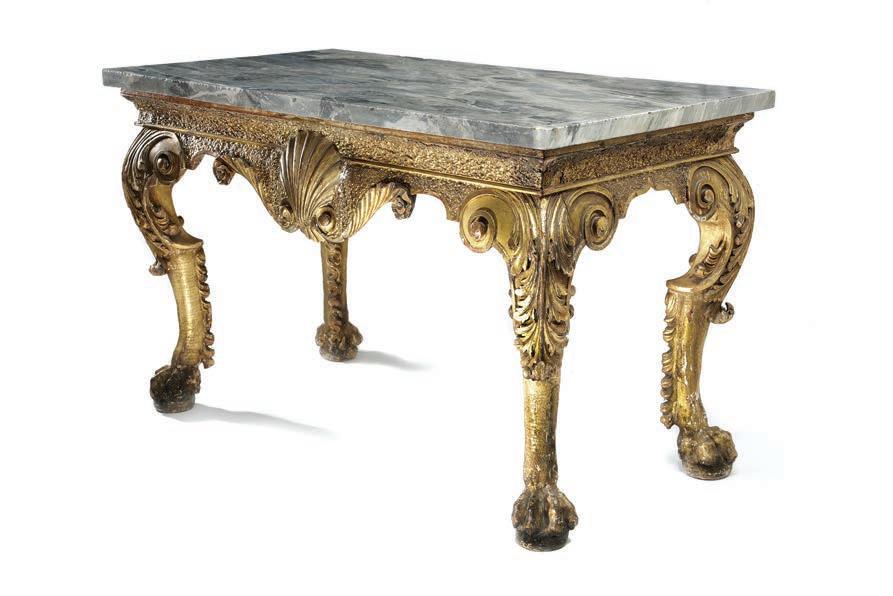
Sold for £87,500

Right:
Sold for £56,250
33
Mezcala mask
Guerrero, Mexico, circa 300 BC–300 AD
An Attie standing female figure
Coast
Both from the Romy Rey collection
Above:
A fine pair of George III blue John and ormolu mounted vase perfume burners. By Matthew Boulton and John Fothergill, c.1775
A George II style giltwood side table
In the manner of William Kent
Visit woolleyandwallis.co.uk/buying for additional charges on final hammer price. Sold prices include buyer’s premium |
SALE HIGHLIGHTS
OCTOBER 2022 DESIGN
Above:
OCTOBER 2022 SILVER & OBJECTS OF

VERTU
Above:
A silver hunting beer jug with a set of twelve beer mugs, by L.A Crichton, London 1930
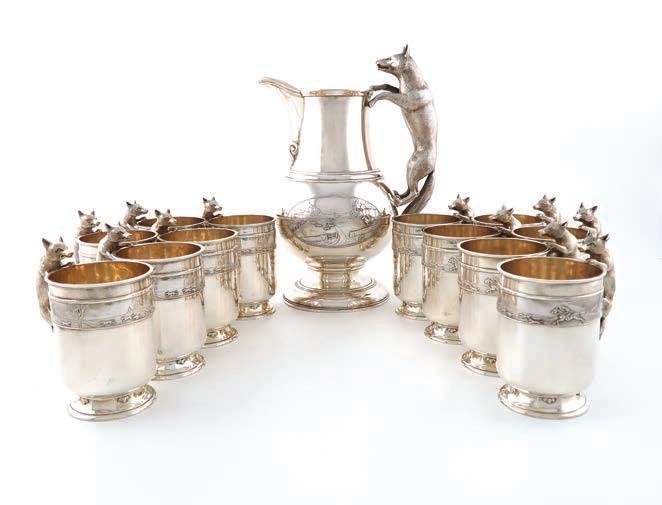
Sold for £18,750
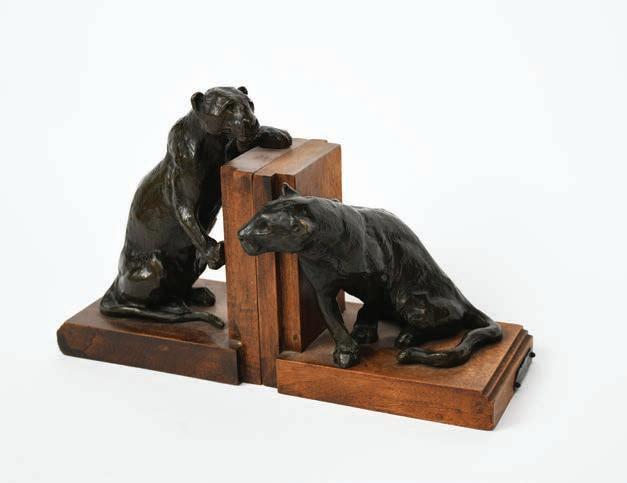

Right:
A
Sold for £6,875
| SALE HIGHLIGHTS 34
Left: Dale Chihuly (born 1941) Persian Set, PP01, 2001 Sold for £3,500
Roger Godchaux (1878–1958) Panthers
Sold for £15,000
William IV silver ‘castle-top’ vinaigrette, Tintern Abbey, by Edwin Jones, Birmingham 1836
Below left: Gillot & Co., a rare Art Deco gem-set and diamond brooch, circa 1920
Sold for £36,250
Below:
A rare emerald and diamond ‘zarf’ cup, 19th century
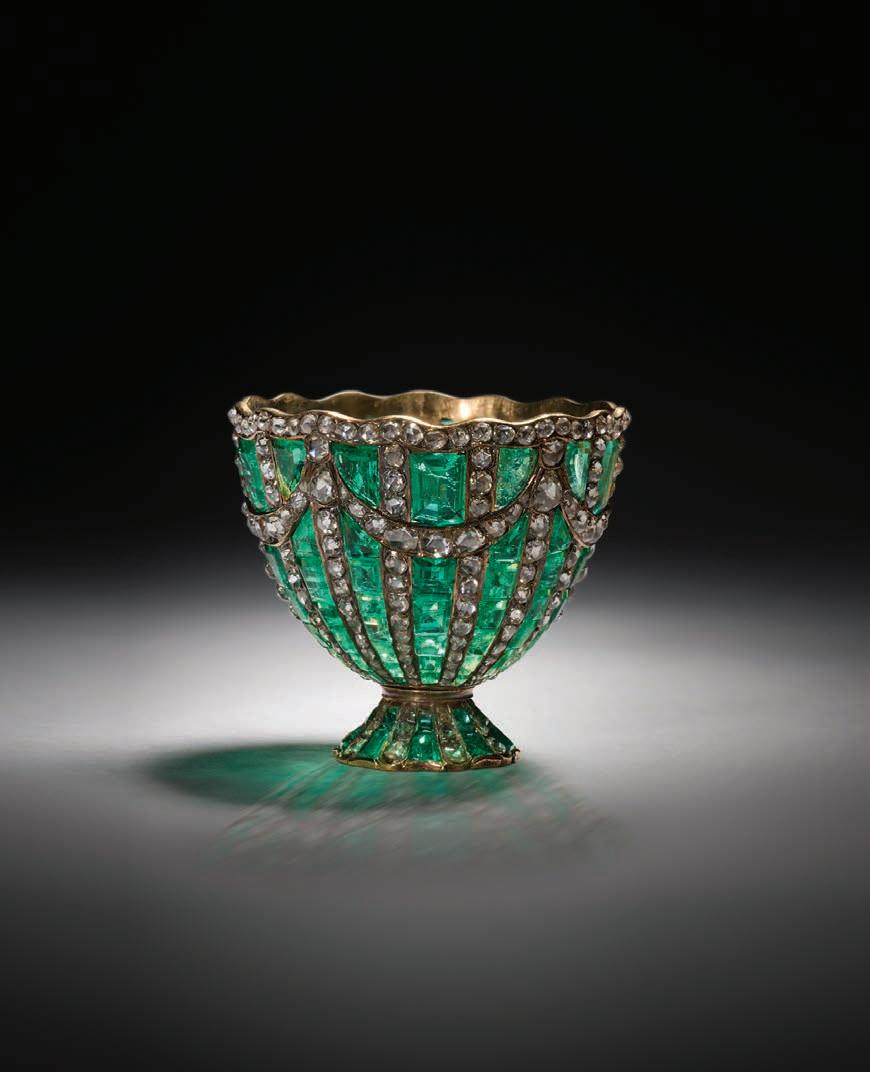
Sold for £105,000
NOVEMBER 2022 FINE JEWELLERY
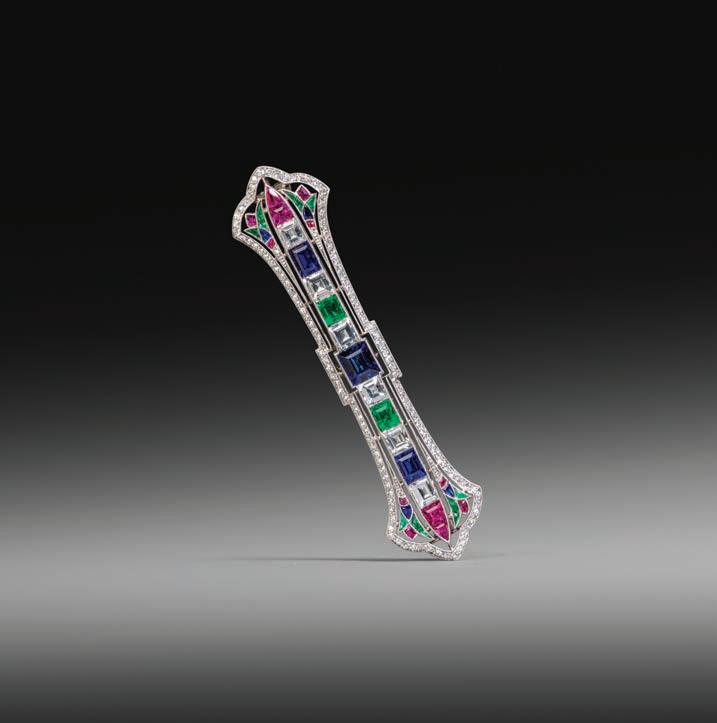
NOVEMBER 2022 JAPANESE WORKS OF ART
Left: Utagawa Hiroshige (1797–1858)
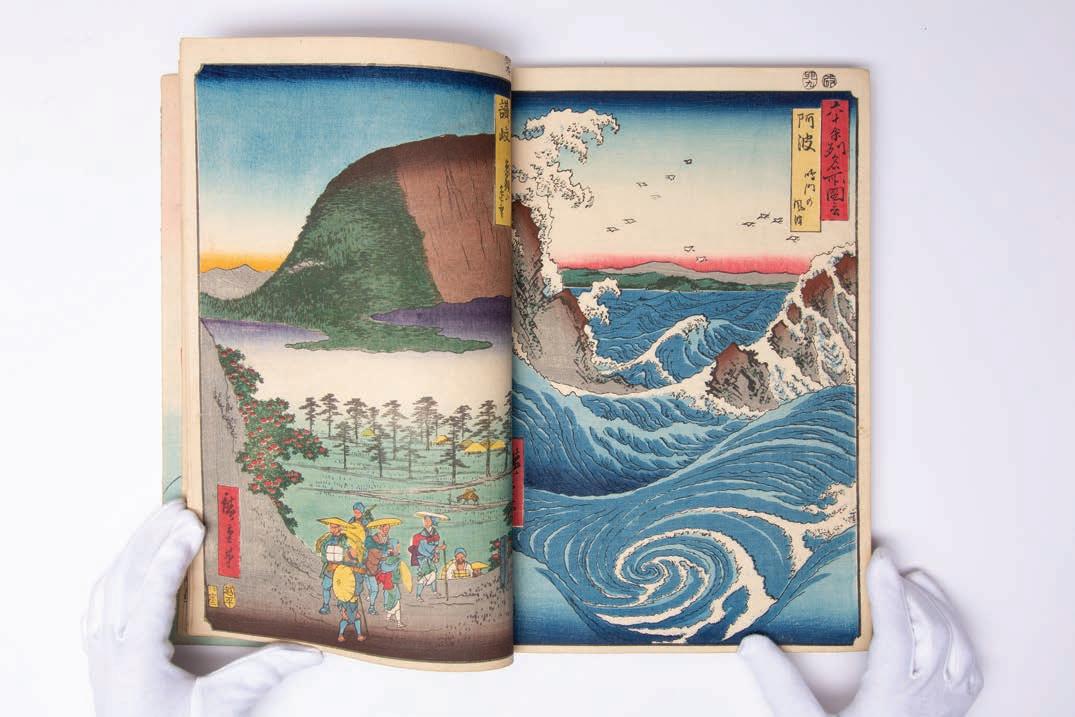
A rare album of 69 views from Rokujuyoshu Meisho Zue (Famous Views of the Sixty-odd Provinces)
Edo period, c.1853–58
Sold for £110,000
Visit woolleyandwallis.co.uk/buying for additional charges on final hammer price. Sold prices include buyer’s premium | 35
SALE HIGHLIGHTS
NOVEMBER 2022
FINE CHINESE WORKS OF ART
Above:
An exceptional and rare pair of Chinese Imperial yellow-ground Tibetan style ewers, penba hu, six character Jiaqing marks and of the period 1796–1820
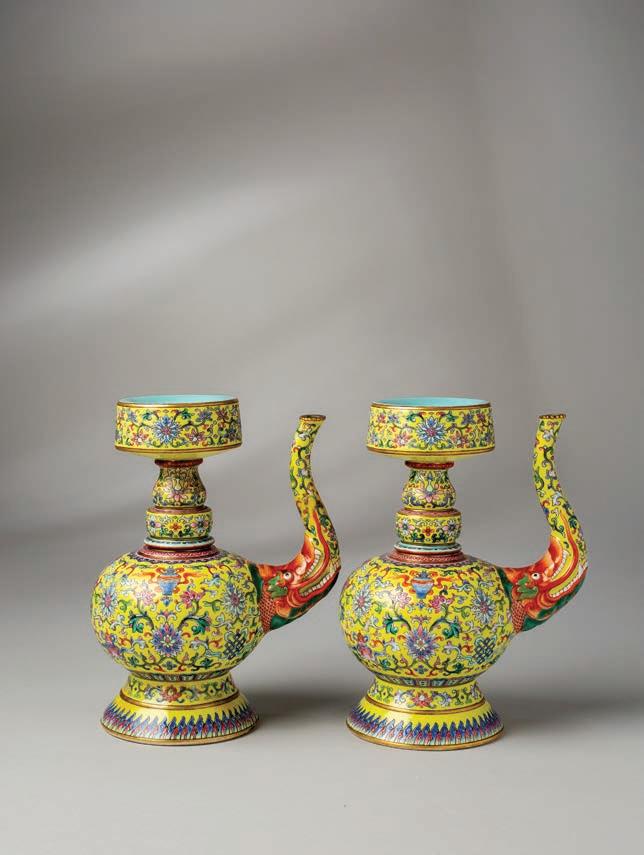
Sold for £256,000
NOVEMBER 2022
MEDALS & COINS, ARMS & ARMOUR
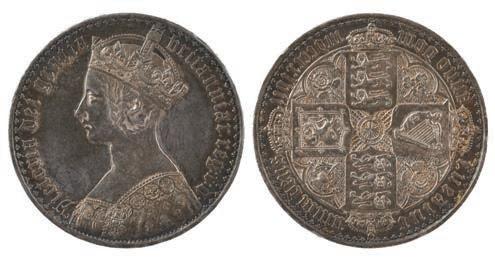
Above:
A fine and rare pair of Chinese Imperial iron-red decorated and underglaze blue ‘sea creatures’ bowls, six character Daoguang marks and of the period 1821–50
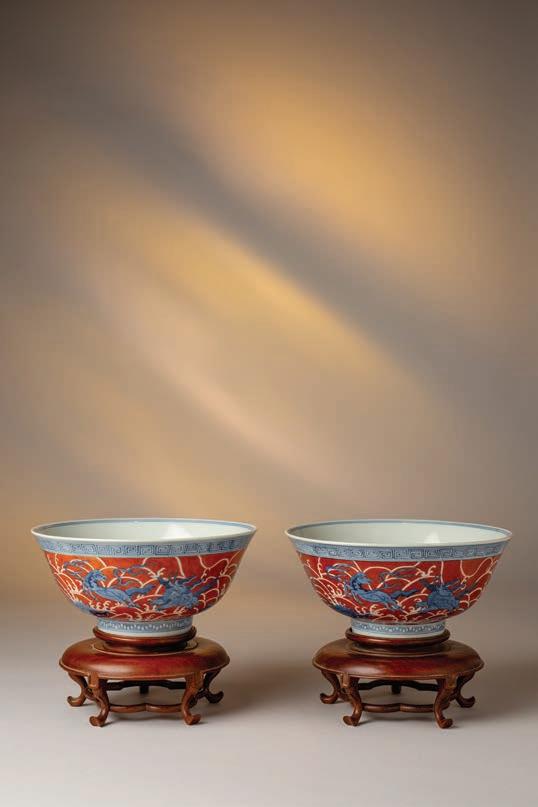
Sold for £56,000
Above:
Victoria: silver crown, 1847
Sold for £7,125
Above:
The A.F.C. group of nine medals to George Reginald Ashton, R.N.A.S & R.A.F
Sold for £2,375
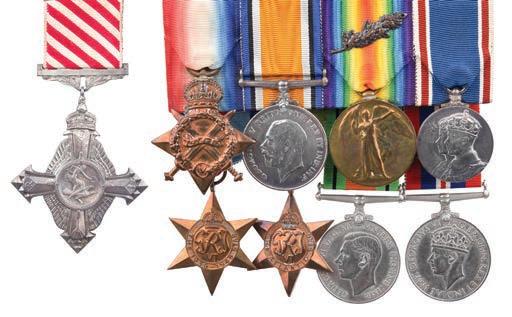
| SALE HIGHLIGHTS 36
Above: Akiko Hirai (born 1970)
Extra Large Moon Jar, 2019
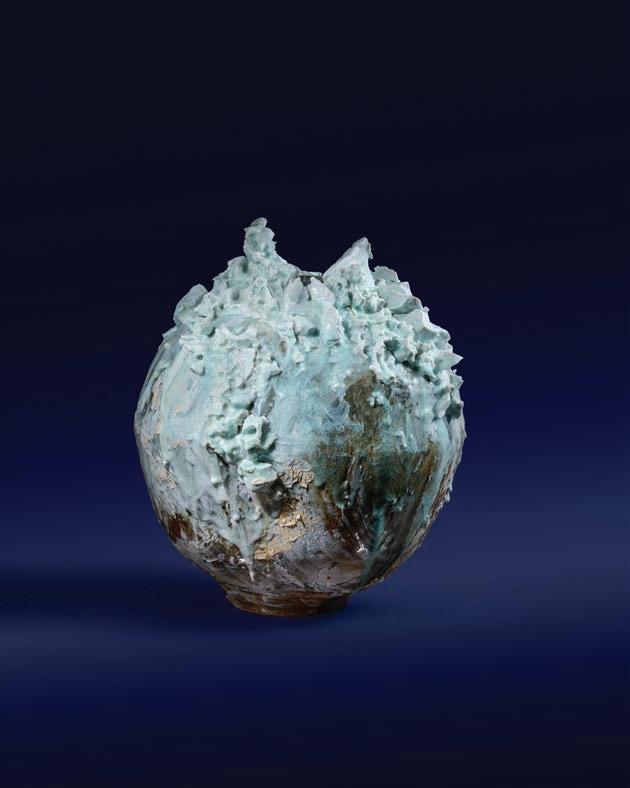
Sold or £25,000
SALE HIGHLIGHTS
NOVEMBER 2022
BRITISH ART POTTERY
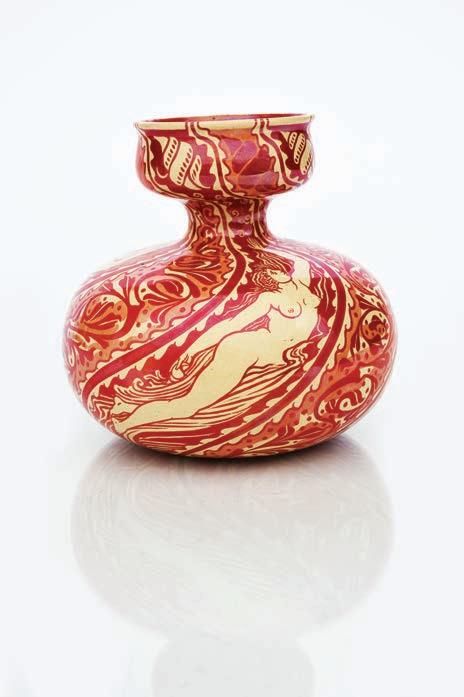
Right: Walter Crane (1845–1915) Divers (Mermaids)
Sold for £16,250
DECEMBER 2022
MODERN BRITISH & 20TH CENTURY ART
Left: Paul Henry (Irish 1876–1958)

Irish landscape with turf stacks, and mountains beyond
Signed PAUL HENRY (lower right)
Oil on canvas 36 x 40.5cm
Sold for £150,000
Above:
Ivon Hitchens (1893–1979)
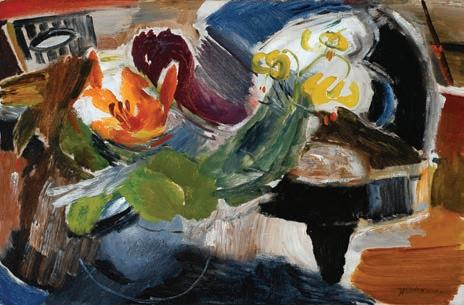
Orange and yellow lillies
Signed Hitchens (lower right)
Oil on canvas
56.3 x 85.2cm
Sold for £50,000
Visit woolleyandwallis.co.uk/buying for additional charges on final hammer price. Sold prices include buyer’s premium | 37
SALE HIGHLIGHTS
JANUARY 2023
FURNITURE, WORKS OF ART & CLOCKS
An
JANUARY 2023
SILVER & OBJECTS OF VERTU
A
Far right:
An
Below:
A George I giltwood and gesso candlestand
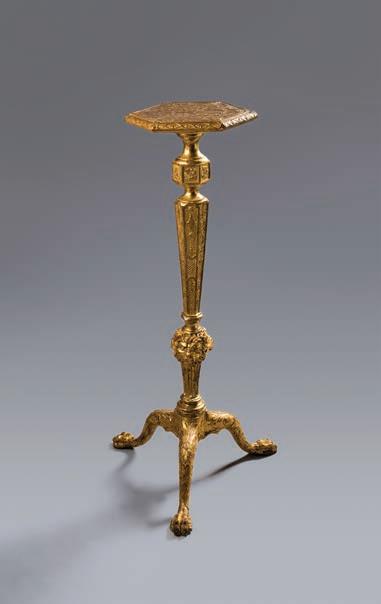
In the manner of James Moore, c.1720–25

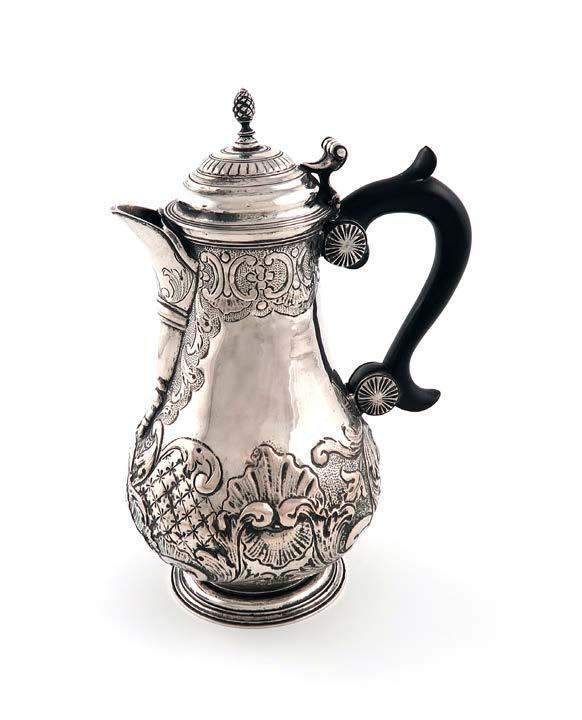
Sold for £8,125
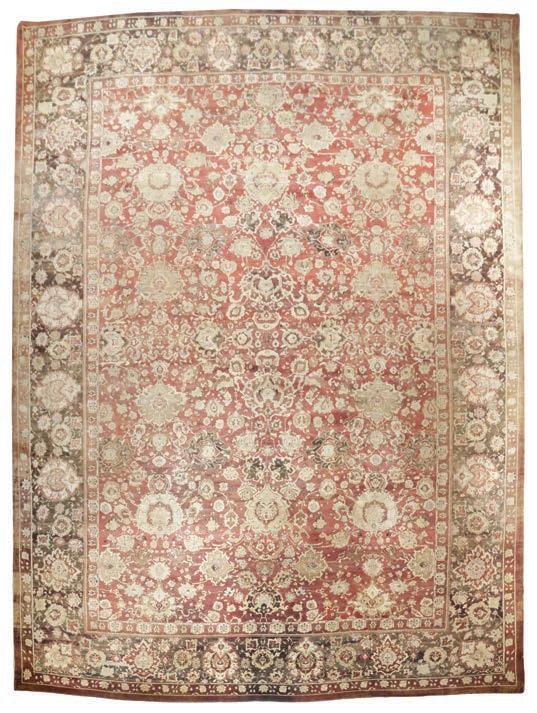
| SALE HIGHLIGHTS 38
Right:
late Elizabeth I/James I silver-mounted coconut cup, unmarked, circa 1600–1620
Sold for £6,875
18th century Maltese silver coffee pot, maker’s mark possibly MP, Pinto Period, circa 1740
Sold for £21,250
Left:
Amritsar carpet North West India, c.1890 Sold for £21,250
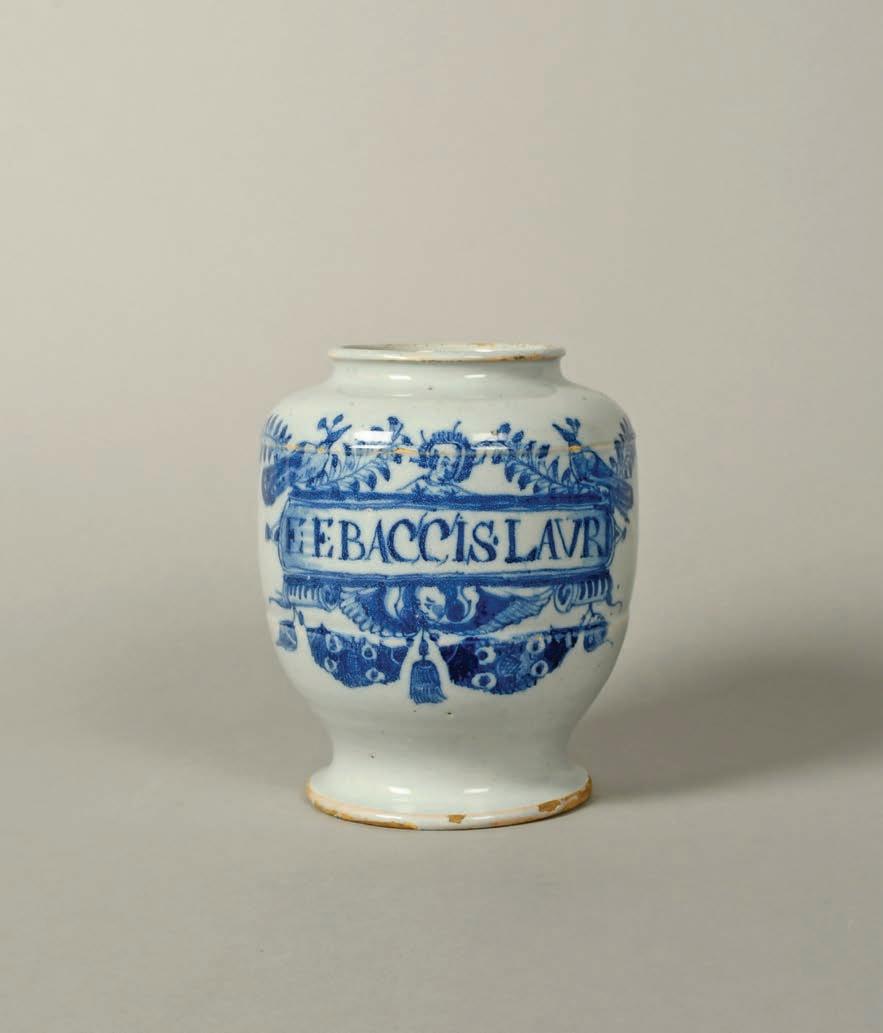
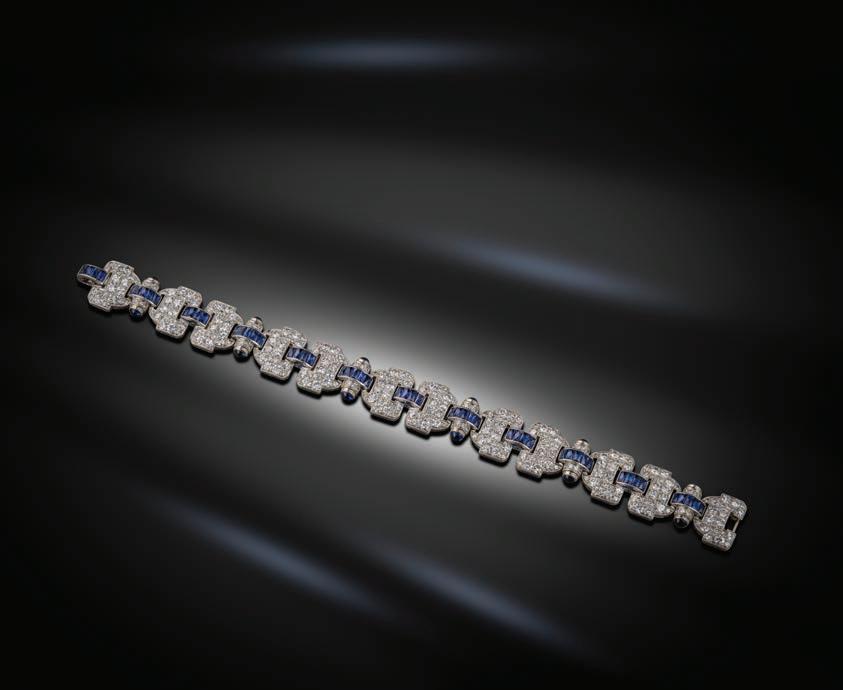
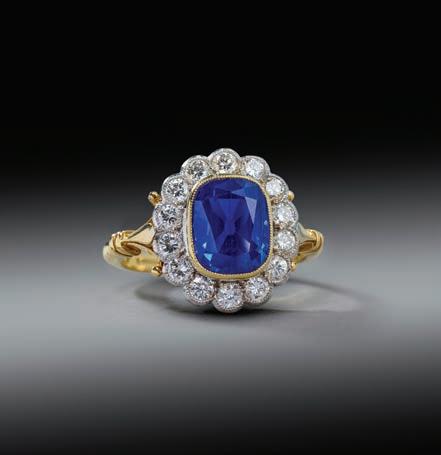
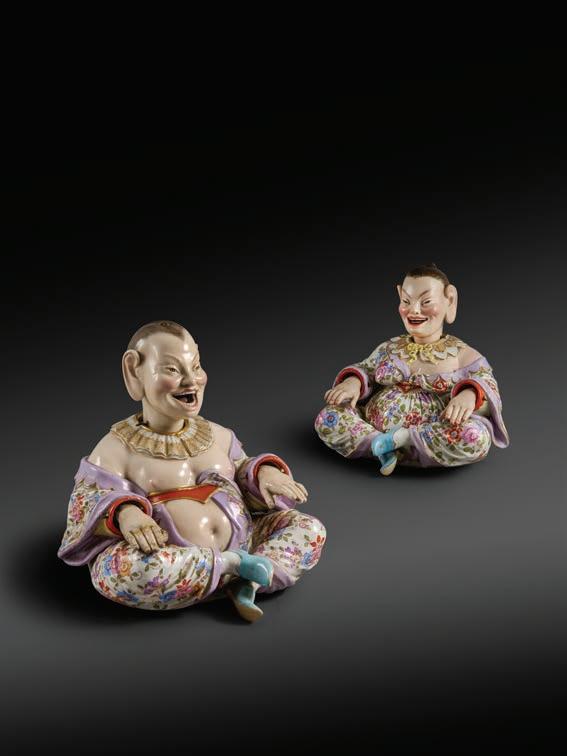
Visit woolleyandwallis.co.uk/buying for additional charges on final hammer price. Sold prices include buyer’s premium SALE HIGHLIGHTS FEBRUARY 2023 FINE JEWELERY FEBRUARY 2023 FINE POTTERY & PORCELAIN late 19th/20th century Sold for £6,000 Right: A London delftware drug or apothecary jar, c.1680 Sold for £12,500
A sapphire and diamond ring Sold for
Above left:
£35,000
An Art Deco sapphire and diamond bracelet Sold for £20,000
Above:
SALE HIGHLIGHTS
FEBRUARY 2023
ARTS OF AFRICA, OCEANIA AND THE AMERICAS
Above: A Niue Island barkcloth
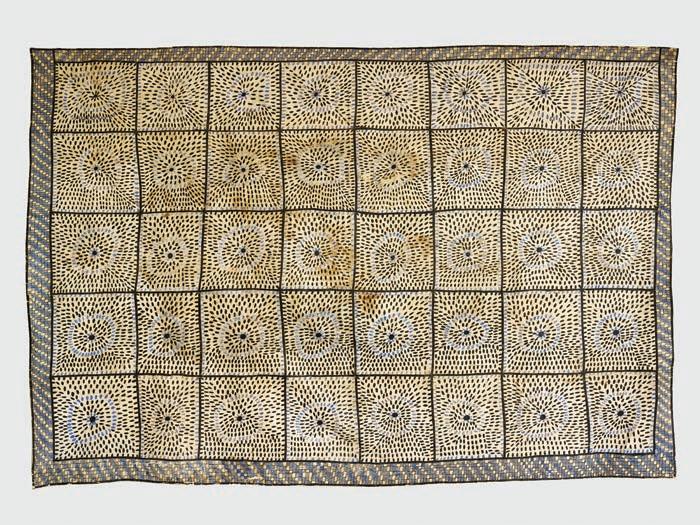
Polynesia
Sold for £7,500
MARCH 2023
Above right: A Moche stirrup spout portrait head vessel Peru, circa 200–600 AD

Sold for £2,250
OLD MASTERS, BRITISH & EUROPEAN PAINTINGS
Above:
Ernest Koerner (German 1846–1927)
The Temple of Horus at Edfu, Egypt
Signed and dated Ernst Koerner 1888
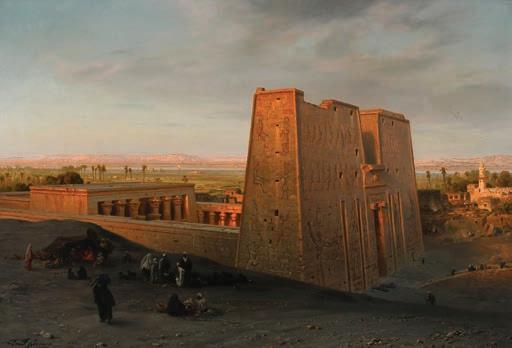
(lower left)
Oil on canvas
100.5 x 150cm; 39½ x 59in
Sold for £50,000
Above:
Attributed to Thomas Wyck (Dutch 1616–1677)
View of the Thames at Westminster on Lord Mayor’s Day
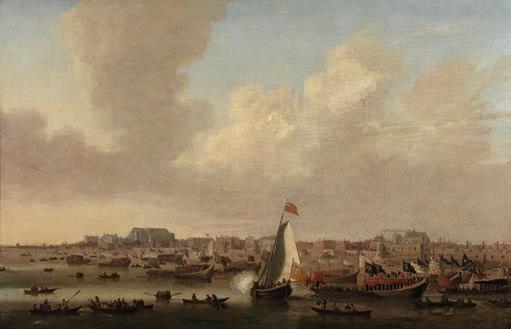
Oil on canvas
60.9 x 90.9cm; 24 x 35¾in
Sold for £47,500
| SALE HIGHLIGHTS 40
THE LAWRENCE JADE COLLECTION
Our Asian Art department is proud to be collaborating with the Oriental Ceramic Society and recently arranged a handling session of an important collection of Chinese jade carvings that we will be selling later in the year. This event at Burlington House in the Society of Antiquaries was timed to coincide with the Society’s annual Woolf Jade lecture. This is the one annual event which attracts the world’s leading jade scholars, academics, curators and collectors.
The collection we will be offering was formed by Murray Lawrence and his father Neville. It includes stunning Qing dynasty vessels, figures and seals mostly purchased from Spink & Son in the 1950s and includes items from the collections of Major-General Charles Gordon, Sir John Buchanan-Jardine, Hugh S Whitaker as well as Queen Marie of Yugoslavia.


Visit woolleyandwallis.co.uk/buying for additional charges on final hammer price. Sold prices include buyer’s premium | 41 NEWS
GANDHI
In 1921 Mahatma Gandhi made the decision to change his clothing from the elaborate Gujarati attire to a simple dhoti and shawl. He decided that as he was to work for the poor people of India, to identify with them, he should not wear different clothes.
Following an invitation to afternoon tea at Buckingham Palace by George V, Gandhi insisted he would still ware his dhoti and shawl. Later, when asked if he was not wearing enough clothes to meet the King, Gandhi is reported to have remarked, “The King had enough on for both of us”.
Above:
A finely carved sandalwood figure of Mahatma Gandhi
Estimate £8,000–12,000

| NEWS 42 NEWS
In January our African and Oceanic Art department became the first to run a timed online auction with their colourful offering of Adornment: The Romy Rey Collection. This latest in a series of sales of the eclectic and expansive collection of the artist, Romy Rey, surpassed expectations with a sell rate of 100% and a sale total of just over £115,000. While there are no current plans for departments to run regular timed sales, there are clearly some areas which benefit from this flexible and arguably more relaxed style of auction.

NATALIE MILSTED

Congratulations to our Managing Director, Natalie Milsted, who has just achieved the remarkable feat of becoming a Six Star Finisher by completing all six of the world’s major marathons, making her the 354th British woman to accomplish this. (For those of us who only run if someone is chasing us, those six are London, New York, Chicago, Boston, Berlin and Tokyo). The impressive tick-list has taken Natalie 10 years to achieve, (with delays caused by Covid travel disruptions), and has seen her clock up 157 miles in total – to say nothing of all the training she has put in. Unsurprisingly, the number of people to have achieved the Six Star status since it started in 2016 is small – standing at 8,143 at the end of last year.

Visit woolleyandwallis.co.uk/buying for additional charges on final hammer price. Sold prices include buyer’s premium | 43
NEWS ADORNMENT
WORSHIPFUL COMPANY OF ART SCHOLARS
We are proud to announce that Alexandra Aguilar has become a Freeman of the Worshipful Company of Art Scholars, while our Chairman, John Axford, has been elevated as a liveryman. The company is relatively young in comparison with other London Guilds, and achieved Livery status in 2014. It represents all those involved in the study, curation, collection and trade in antiques, art and antiquities. John and Alexandra are photographed here with John Spanner, past Master and now Deputy Master.

TOM TALKS TOLKEIN
We are delighted to continue our long-standing support of the Chalke Valley History Festival by sponsoring Tom Holland’s talk on 30th June. Following the publication of his recent book Dominion, Tom will be talking about J R R Tolkein and how the events of two world wars impacted on Middle Earth and the fictional worlds Tolkein created in the Lord of the Rings trilogy. Tom is a warm and charismatic speaker whose enthusiasm for his subject is contagious, and we look forward to listening to him.

| NEWS 44 NEWS
Credit: Charlie Hopkinson
DIRECTORS & HEADS OF
CHAIRMAN
HEAD OF ASIAN ART
John Axford MRICS ASFAV
+44 (0)1722 424506
jea@woolleyandwallis.co.uk
20TH CENTURY DESIGN
Michael Jeffery
+44 (0)1722 424505
mj@woolleyandwallis.co.uk
ENGLISH & EUROPEAN
CERAMICS & GLASS
Clare Durham

+44 (0)1722 424507
cd@woolleyandwallis.co.uk
JAPANESE WORKS OF ART
Alexandra Aguilar
+44 (0)1722 424583
aa@woolleyandwallis.co.uk
MEDALS & COINS, ARMS & ARMOUR
Ned Cowell +44 (0)1722 341469





nc@woolleyandwallis.co.uk
SILVER
Rupert Slingsby +44 (0)1722 424501




rs@woolleyandwallis.co.uk
VALUATIONS
Jeremy Lamond MRICS ASFAV FRSA
+44 (0)1722 424502
jl@woolleyandwallis.co.uk
MARKETING
Chloe Davie +44 (0)1722 446951
chd@woolleyandwallis.co.uk
MANAGING DIRECTOR
FINANCE & COMPLIANCE
Natalie Milsted FCCA
+44 (0)1722 424599
nm@woolleyandwallis.co.uk
CHINESE PAINTINGS
Freya Yuan-Richards

+44 (0)1722 424589
fyr@woolleyandwallis.co.uk
FURNITURE, WORKS OF ART & CLOCKS
Mark Yuan-Richards
+44 (0)1722 411854
myr@woolleyandwallis.co.uk
JEWELLERY
Marielle Whiting FGA





+44 (0)1722 424595
mw@woolleyandwallis.co.uk
PAINTINGS
Victor Fauvelle
+44 (0)1722 446961
vf@woolleyandwallis.co.uk
PAINTINGS
Ed Beer +44 (0)1722 446962
eb@woolleyandwallis.co.uk
AFRICAN & OCEANIC ART ANTIQUITIES
Will Hobbs +44 (0)1722 339752
wh@woolleyandwallis.co.uk
OFFICE
Ruth Pike
+44 (0)1722 424593
rp@woolleyandwallis.co.uk
DEPARTMENTS

www.woolleyandwallis.co.uk Designed by A Drewitt Design www.adrewittdesign.com



















 Clare Durham +44 (0)1722 424507
Clare Durham +44 (0)1722 424507













































































































